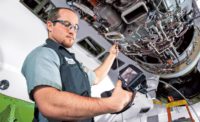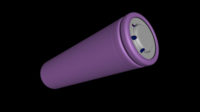The development of uniform standards to ensure quality across an entire industry is a monumental undertaking that demands great collaboration. Achieving that collaboration requires an organization to take the lead, bring all stakeholders together, and convince those involved of the value the process holds.
Twenty-five years ago, the International Aerospace Quality Group (IAQG®) sought to harmonize the aviation, space, and defense industries by eliminating unnecessary duplication while elevating standards. This impacts not just quality but also safety so that people can have confidence, whether that is stakeholders, customers, or passengers, to feel safe boarding an aircraft or vessel.
IAQG is a not-for-profit organization that sets the high standard for quality within the global supply chain. The international group contains member companies that design, develop, manufacture, and support original equipment at system or subsystem levels within the aerospace, space, and defense industries.
The aviation industry came together to establish IAQG with the safety of its passengers in mind. IAQG members, 100 and growing, span the globe and include the industry’s biggest names, such as Airbus, BAE Systems, Bell Textron, GE Aerospace, Honeywell, Leonardo, Lockheed Martin, Mitsubishi Heavy Industries, Northrop Grumman, Raytheon Technologies, and SUBARU.
Formed to improve supply chain processes and ensure the consistent delivery of high-quality and safe products through industry partnership and standardization, IAQG drives collaboration.
“What makes the IAQG such a steward of our industry is how we collectively look for opportunities to deliver value to not only our members but equally to our suppliers and the industry. Questions like ‘Where do we go next?’ and ‘How do we expand beyond standards, leveraging our existing tools and materials, and creating more value for our stakeholders?’ continue to motivate the entire organization to do better and be better for every stakeholder, especially our end-users,” explained Eric Jefferies, IAQG President and Sr. Manager, Process Integrity and Compliance for Bell Textron.
The mission of the IAQG brings organizations together, working collaboratively and dynamically, and looking toward the future to ensure that not only today’s requirements are met but any future requirements that organizations, or the industry at large, contemplate.
These efforts are realized through working with all stakeholders to establish a commonality of quality systems and improvement standards. The standards, known as the 9100 series, are documented, published, and applied internationally by original equipment manufacturers (OEMs) and circulated throughout the supply chain.
“The IAQG sets the high standard of harmonizing those requirements that flow across the supply chain. As a result, we get safer, more consistent, more reliable products,” Jefferies added.
By working together, challenges are both more easily identified and resolved.
Global Impact
As many aviation manufacturers and suppliers also operate in the space and defense sectors, IAQG’s value extends to serving the global aviation, space, and defense environments.
Prior to the creation of IAQG, OEMs followed their own quality standards, which each customer dictated. That resulted in an unwieldy number of quality management audits.
The creation of universal industry standards for safety and performance, accepted by all parties, relieves aerospace and defense companies of that burden, providing value in time and money to all members, suppliers, and the industry as a whole. When the requirements are harmonized, a more consistent or repeatable approach begins, and the supply chain no longer has to address multiple different approaches to what is often the same thing.
That standardization, known as the IAQG Certification Scheme, covers over 18,000 Aerospace Quality Management System certifications from 25,000 sites globally.
To ensure uniform auditors’ training at certification bodies, IAQG developed a standardized training curriculum to reduce the potential for variations. Approximately 2,000 auditors worldwide are held to those standards.
The IAQG Certification Scheme is recognized by authorities such as the Acquisition, Technology & Logistics Agency (ATLA) in Japan; the Defense Contracting Management Agencies (DCMA) in the United States; the North Atlantic Treaty Organization (NATO); the European Aviation Safety Agency (EASA); and the Federal Aviation Administration (FAA).
As a result of this international collaboration, IAQG has progressed several tools that assist with the development, communication, and continuous standard improvements. Regardless of an organization’s size and, in some cases, industry, these products and materials are freely available.
Industry guidance materials
The Supply Chain Management Handbook (SCMH®) provides no-cost guidance materials to the industry and beyond. It includes best practices, supplemental guidance, support tools, charts, graphs, webinars, etc., submitted by a combination of suppliers and OEMs for the greater good of the entire aviation, space and defense field. These materials help ensure the timely delivery of quality products throughout the supply chain.
SCMH was developed by IAQG, utilizing input from many subject matter experts throughout the industry. This collective voice allows its material to be applicable to companies from the largest to the smallest because it considers these organizational types when creating content. Continuously updated as changes and improvements are identified, SCMH guidance topics cover the entire lifecycle of a product and address subjects such as:
- risk management;
- capacity management;
- ordering and logistics;
- cybersecurity;
- project management;
- data science and artificial intelligence;
- and sales, master scheduling, and sequencing.
Over 17,000 registered users access the more than 218 SCMH documents over 8,000 times monthly.
A roadmap for internal quality improvement
The Aerospace Improvement Maturity Model (AIMM®) assists organizations in improving their internal quality management system (QMS). It extends beyond meeting the 9100 series standards by creating a roadmap for measuring improvement progression.
With AIMM, an organization can self-evaluate its current maturity level and set clear targets for improvement on a five-level graduate scale. AIMM can be used successfully by certified or non-certified organizations, either for the scope of a 9100-compliant QMS or specific areas of interest.
The model comprises 26 modules, developed by IAQG experts and thoroughly reviewed and validated through several industry field trials. This application supports the performance of self-assessments against the model, which can be planned and tailored to users’ needs.
AIMM serves as a guidance tool that supports the transition from inefficiency to effectiveness, thereby enhancing operational efficiency within any organization. The journey towards improvement is amplified in an environment conducive to self-monitoring, nurturing a proactive quality culture among all stakeholders.
Global supply chain certification
The Online Aerospace Supplier Information System (OASIS®) helps organizations in the aerospace industry ensure they are working with high-quality partners. The publicly available online database builds accountability within the supply chain. It lists which companies have been certified to which standards, such as 9100, 9110, and 9120; which oversight body that certification occurred through; and the last time their certification body assessed them.
OASIS provides a reliable source for aerospace supplier certification and registration data by listing all bodies involved in the process, such as national accreditation bodies, certification bodies, and authenticated aerospace experienced auditors.
The system also includes all audits of industry members. Anyone seeking information from those audits can request Level Two access through the certification body. Once granted, individuals can see details of nonconformances and the member’s response to any audit findings.
Additionally, the OASIS platform can be used to solve conflicts. The platform maintains an active feedback system for organizations and their certification bodies, reinforcing accountability. For example, if a customer cannot resolve a dispute with an IAQG organization, they can file a “feedback ticket” in OASIS. In turn, that ticket could result in an immediate investigation or be considered during the following certification review.
Participants in the aerospace and defense industries can use OASIS to monitor suppliers’ compliance by creating a “watchlist.” They are notified of every action related to the supplier’s certificate, such as an audit, and can review those actions.
Preparing for the future
The aviation, space and defense industry has embraced the IAQG and the level playing field it creates. As the organization continues to grow, it remains focused on meeting current and future requirements set forth by its members and the industry. With the addition of new members who want to contribute to advancing industry thought leadership, the whole supply chain is able to grow and meet the future demand that lies ahead.



